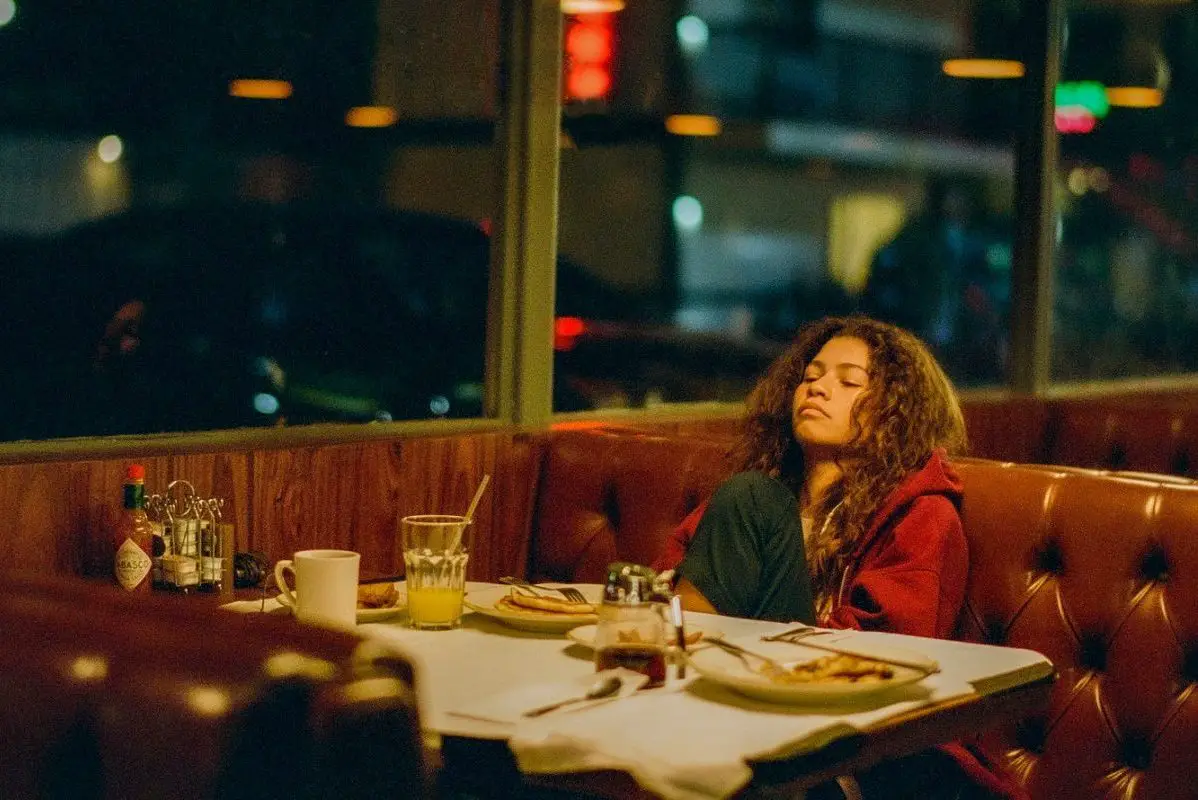As the second season of “Euphoria” comes to a close, fans of the show reflect on its overall premise: a visual representation of the real-life effects of adolescent drug abuse.
Rue Bennett, a student at East Highland High School and the main character of “Euphoria,” is at best a troubled teenager and a drug addict; however, despite hitting rock bottom, she continues to dig deeper. Although she is an unreliable narrator who portrays her drug use through an overly glamorized lens, Rue’s character possibly offers the most realistic representation of teenage drug abuse on television today.
Everyone Has Their Addictions
The HBO series’s popularity stems from its heavily dramatized depiction of the high school experience. Covering topics that include abusive relationships, the consequences of untreated mental illness and struggles with gender and sexual identity, “Euphoria” is considered extremely controversial. The name of the show suggests addiction, specifically Rue’s drug addiction; however, each character has their own poison — whether drug-related or not — that will become their downfall sooner or later.
The main cast comprises six characters: Rue, Jules Vaughn, Maddy Perez, Cassie Howard, Kat Hernandez and Nate Jacobs, all with their individual traumas. Rue, scarred by her father’s death at a young age, is a victim of the U.S. health care system’s tendency to medicate mentally ill children as opposed to providing a long-term therapeutic solution.
Jules (Hunter Schafer), Rue’s best friend and eventual romantic partner, is a trans girl forced to attend conversion therapy by her alcoholic mother at the age of 11. Maddy (Alexa Demie) is the East Highland and fan-proclaimed “It Girl.” She’s in a stereotypical high school relationship with the school’s star quarterback, Nate Jacobs (Jacob Elordi). However, behind the scenes of their outwardly perfect relationship, their dynamic is far from healthy — the majority of Season 1 revolves around Maddy covering for Nate after he strangled her at a town fair.
Nate lives an idyllic suburban lifestyle with wealthy parents who are heavily involved in the community. Underneath the perfect family image, Nate’s mother is a functional alcoholic, and his brother, Aaron (Zak Steiner), is the black sheep of the family. In addition, Nate (much like his father) is suggested to be living a closeted existence. He begins to resent his father, Cal (Eric Dane), after he pushes Nate to play football and vicariously lives through him. Of course, a majority of his trauma roots from accidentally coming across Cal’s adult film collection when he was 11, which included recordings of Cal cheating on Nate’s mother with various men and eventually Jules. Nate’s need for control leads him to attack Maddy — who is the one person he is not able to control.
Kat (Barbie Ferreira) is the exception in the group; she didn’t receive trauma from her parents. It wasn’t until her first boyfriend broke up with her for gaining weight that she developed body image issues and began relying on fantasy worlds to temporarily escape from and cope with her everyday life. In the first season, Kat becomes a financial dominatrix and does cam shows as a way to build her confidence, but it only makes her feel worse once she stops.
Cassie (Sydney Sweeney) is the daughter of a functioning alcoholic mother and a drug-addicted absentee father who she’s been chasing after ever since he divorced her mother. After he robs their house, he is never seen again and as a result, Cassie conforms to the wants of every guy she dates so they don’t leave her as her father did.
Effects of Rue’s Addiction
Whether it is a need for validation, the perfect relationship, control, an escape from reality or love, just like her peers, Rue is shown to be totally at the mercy of her addiction, which seems to originate from the same psychological needs that haunt her friends. Drugs are her escape from dealing with the death of her father, a way to control her mental illness, a sure way to suppress the thought that she is a burden to everyone around her, and her go-to when she feels rejected by Jules within their heavily co-dependent relationship.
The relationship between Rue and her sister, Gia (Storm Reid), is touch-and-go at best, and her relationship with her mother, Leslie (Nika King), is even more so. The cycle of drug abuse in the Bennett family stems from Leslie’s own past history of drug abuse, which was passed on to Rue just like her sponsor Ali (Colman Domingo) described to her: “You, Rue, came out the womb a beautiful baby girl, who unbeknownst to her had a couple wires crossed. So, when you tried drugs for the first time, it set something off in your brain that’s beyond your control.” And just like that, if Rue is unable to reach sobriety, there’s the possibility that Gia, who has already experimented with recreational drugs, will head down the same path.
Throughout “Euphoria,” Rue exhibits increasingly life-threatening behaviors: mixing drugs, running into traffic to escape the police and borrowing a suitcase containing thousands of dollars’ worth of drugs that she needs to sell — or else face enormous consequences. On top of that, her mental health is at an all-time low, and because she is unable to get prescriptions due to her past addiction, Rue’s manic-depressive episodes become more frequent. She often throws all impulse control out the window, but especially after discovering Jules flushed the rest of the suitcase.
From the start of Season 2, the non-idealized version of events outside of Rue’s narration is brought to light — not only the process of her withdrawal but the financial woes faced by her mother as the costs for Rue’s numerous hospital visits and rehab stays pile up. Episode 5, “Stand Still Like the Hummingbird,” is where this peak is hit, as Rue’s family and Jules are finally made aware of the severity of her condition, where she had hit rock bottom. But the subsequent police chase shows that her addiction is the shovel and nothing will stop her from digging.
Does Euphoria Glamorize Addiction?
“Euphoria” doesn’t necessarily glamorize drug abuse, at least not in the way it has been accused by its detractors. Rue is meant to be an unreliable narrator; the show is entirely through her eyes: The party scenes that take on a glittery and dream-like hue are nothing more than a visualization of Rue’s experiences post-drug consumption. All of the verbal and physical fights Rue gets into with her mother, all the times where she almost overdoses, where she verbally abuses her friends, hallucinates pill bottles talking to her and her inability to even go to the bathroom is far from glamorizing drug abuse, but instead portrays genuine actions that have been repeated again and again by real-life addicts. In fact, Sam Levinson, the show’s writer, used his own experience with drug addiction to write “Euphoria.”
Instead of condemning “Euphoria,” understanding its portrayal of drug addiction as a sympathetic example of what adolescent drug addiction looks like can help viewers identify those traits in friends and family. Similarly, these viewers can hopefully spark conversations about issues that the standard D.A.R.E. or Truth ads might not be able to.

















